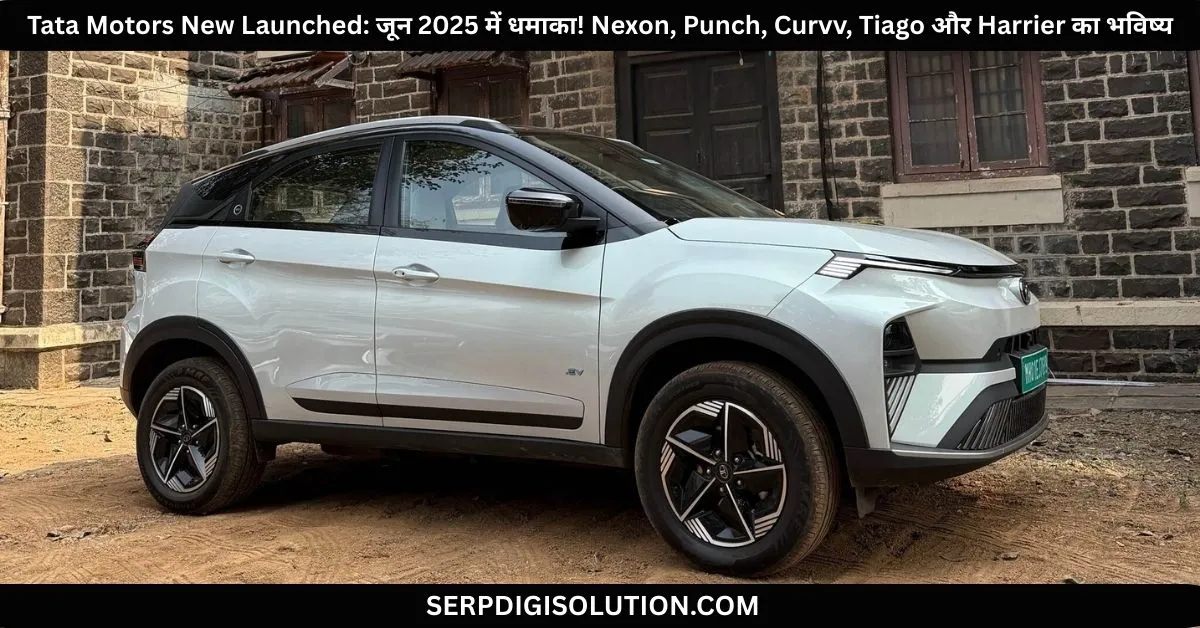और समाचार
🎧 Skullcandy(Crusher Wireless Headphone) का धमाका! Crusher Headphones और Sesh ANC Earbuds भारत में! 🎧
Crusher Wireless Headphone:- Skullcandy ने भारत में दो नए ऑडियो प्रोडक्ट्स लॉन्च…
₹5,999 में ऐसा 5G फोन? Nokia ने कर दिया मिड-रेंज में तहलका!
इम्पैक्टफुल और क्लिक्स-बैटी 1. पहली झलक "सोचा था ज्यादा पैसा खर्च करना…
₹1.85 लाख में KTM की धमाकेदार एंट्री! 160 Duke ने MT-15 और Apache को कर दिया शरमा…
क्या आपने भी सुना है? KTM ने भारतीय बाजार में एक धमाकेदार…
स्मार्टवॉच की बिक्री में गिरावट का असर: क्या आपके AMOLED डिस्प्ले फोन पर पड़ेगा?
एक रिपोर्ट के अनुसार, वैश्विक स्मार्टवॉच शिपमेंट में Q1 2025 में 2%…
सिर्फ अमीरों का ही नहीं रहा EV! ₹7 लाख से भी कम में MG लेकर आई धांसू इलेक्ट्रिक कार – मिलेगी 230KM रेंज और दमदार फीचर्स
अगर आपको लगता था कि इलेक्ट्रिक कार सिर्फ अमीरों की पहुंच में…
यकीन नहीं होगा! सिर्फ एक चार्ज में 663 km, futuristic display, ADAS, और भी सब कुछ सिर्फ Kia EV6 में!
क्या आपने कभी सोचा है कि आपकी अगली कार सिर्फ एक वाहन…
मारुति की सबसे सस्ती स्टाइल स्टेटमेंट: Cervo की कीमत ₹4.5 लाख से शुरुआत, ये फीचर्स देखकर आप चौंक जाएंगे!
1. शॉर्ट स्टाइल हेडलाइन: "मारुति का सुपरस्टाइल Cervo अब इंडिया में —…
भारत में आया VinFast VF 7 इलेक्ट्रिक SUV – जानिए कीमत, फीचर्स और लॉन्च डिटेल्स 🇮🇳
भारत में इलेक्ट्रिक गाड़ियों का बाजार तेज़ी से बढ़ रहा है, और…
भारत आ रहा है Vivo X200 FE Price: कॉम्पैक्ट डिज़ाइन में फ्लैगशिप पावर!
Vivo X200 FE Price:- स्मार्टफोन की दुनिया में Vivo एक बार फिर…
पेश है Apple iPhone 17 Pro Max: स्मार्टफोन का भविष्य?
Apple iPhone 17 Pro Max:- Apple के अगले फ्लैगशिप स्मार्टफोन, iPhone 17…
पीएम मोदी ने जारी किया ₹1000 का खास सिक्का – सम्राट राजेंद्र चोल प्रथम के 1000 वर्षों की नौसैनिक विजय को समर्पित
Pm modi launched 1000 New coin- 27 जुलाई 2025 को प्रधानमंत्री नरेंद्र…
नया Maruti Suzuki Ertiga 2025 देखिए – तेज, स्टाइलिश और फैमिली-फ्रेंडली!
आपकी आँखों के सामने पेश है – Maruti Suzuki Ertiga 2025 का…
धमाकेदार Oppo A78! बजट फोन की दुनिया में तूफ़ान (2025 अपडेट)
फ़र्स्ट लुक: जब बजट बन जाए लक्सरी शक्ति: स्लो नहीं, रेस! बैटरी…
छोटा है पर दमदार! OPPO Reno 15 की कम स्क्रीन लेकिन बेहतरीन पावर के बारे में क्या हैं बातें?
क्या आप तैयार हैं एक ऐसे स्मार्टफोन के लिए जो बोले—“लोग छोटा…
छोटा लेकिन ज़बरदस्त! OPPO Find X8s – साइज़ में छोटा, ताकत में सबसे आगे!
आप सोच रहे होंगे, “इतनी छोटी बॉडी में इतनी जान कैसे समा…
गांव की महिलाएं बनें आत्मनिर्भर! बीमा सखी योजना 2025 के ज़रिए पाएं हर महीने ₹7000 तक की कमाई
Sakhi yojana - अगर आप किसी ग्रामीण इलाके में रहती हैं और…
खुद का बिज़नेस शुरू करें और कमाएं लाखों! सरकार दे रही है ₹9 लाख तक का लोन, जानिए कैसे मिलेगा फायदा
Poultry Farm Loan Yojana 2025 - ग्रामीण भारत में अब खेती-बाड़ी के…
क्या होगा Hyundai Cars का जून 2025 में, जाने Creta, Venue, Exter, Verna और Alcazar का हाल!
नमस्ते दोस्तों! आज हम बात करेंगे Hyundai की उन 5 गाड़ियों के…
क्या हुआ जब ५० मेगापिक्सल, ६० वॉट चार्जिंग और OnePlus 9 जैसा डिज़ाइन मिले Nord 2 Pro 5G में? जानिए सच!
सोचिए—एक स्मार्टफोन जिसमें फ्लैगशिप ग्रेड कैमरा, सुपर-फास्ट चार्जिंग और OnePlus 9 जैसा…
क्या ये Xiaomi 14T Pro आपकी उंगलियों पर फ्यूचर टेक्नोलॉजी ले आएगा?
एक मिनट में पूरी जानकारी—और दिल चुराने की गारंटी! 1. सुपर-डिस्प्ले, सुपर-इम्प्रैशन!…
क्या आपकी Tata Electric Car सड़क की चुनौतियों का सामना कर सकती है? Range का सच!
Tata Electric Car सड़क की चुनौतियों का सामना कर सकती है? Range…
क्या आने वाला है OnePlus Nord 5 में? जानिए अनुमानित स्पेसिफिकेशन्स और लॉन्च डेट
OnePlus Nord 5, जिसके 2024 के उत्तरार्ध में लॉन्च होने की उम्मीद…
क्या Sony WF-C710N आपके बजट में बेस्ट Noise Cancelling Earbuds हैं? जानिए सबकुछ!
आज हम बात करेंगे Sony WF-C710N Truly Wireless Stereo (TWS) earbuds के…
क्या Samsung Galexy Unpacked में मिलेगा सबसे पतला और दमदार फोल्डेबल फोन? (Is Samsung Unpacked Bringing the Thinnest & Toughest Foldable?)
Samsung Galexy Unpacked:- सैमसंग के प्रशंसक बेसब्री से इंतजार कर रहे हैं!…
क्या Renault Boreal (C-SUV) भारत में धमाका करने को है तैयार? जानिए पूरी डिटेल्स!
Renault Boreal:- Renault, एक बार फिर भारतीय बाजार में अपनी पकड़ मजबूत…
क्या Nothing Phone (3) भारत में 12 जुलाई को धमाल मचाने आ रहा है?
नमस्ते दोस्तों! टेक्नोलॉजी की दुनिया में एक और धमाका होने की उम्मीद…
क्या Lumio Arc 7 Projector है ‘Made in India’ का वो जिसका था इंतज़ार? जानिए सच!
Lumio Arc 7 Projector:- सबसे पहले बात कीमत की. Lumio Arc 7…
क्या Infinix Hot 60 5G+ सच में आ रहा है? जानिए पूरी सच्चाई!
नमस्कार दोस्तों! क्या आपने भी Infinix Hot 60 5G+ के बारे में…
क्या HP OmniBook 5 और OmniBook 3 खरीदना लायक है? सच्चाई जानिए
नमस्ते दोस्तों! अगर आप HP OmniBook 5 और OmniBook 3 के बारे…
किसानों के लिए खुशखबरी! सिर्फ ₹1 में मिलेगी लाखों की फसल बीमा सुरक्षा – जानें पूरी योजना
अगर आप किसान हैं या खेती से जुड़े हैं, तो ये खबर…
अद्भुत रेट्रो बुलेट – Royal Enfield Classic 350 ने 2025 में सबको चौंका दिया!
टेक-ऑफ में Modern रॉयलिटी: पुरानी यादों को नया अंदाज़ देते हुए, Royal…
Xiaomi 15 Ultra: जानिए इसकी कीमत, फीचर्स, बैटरी, और गेमिंग अनुभव के बारे में
आजकल स्मार्टफोन की दुनिया में फ्लैगशिप फोन का क्रेज़ बढ़ता ही जा…
Vivo का सबसे सस्ता प्रीमियम 5G स्मार्टफोन लॉन्च, मिलेगा 100W फास्ट चार्जर, 12GB RAM और 256GB स्टोरेज के साथ
Vivo V50 5G लॉन्च - Vivo ने भारत में अपनी V-सीरीज़ को…
Vivo का प्रीमियम स्मार्टफोन सिर्फ ₹14,000 में लॉन्च — 12GB RAM, 256GB स्टोरेज और 100W फास्ट चार्जिंग के साथ!
Vivo v40 5G launched in india:- Vivo ने एक बार फिर भारतीय…
Vivo V60 launched in india – Snapdragon 7 Gen 4, 6500mAh बैटरी और ZEISS कैमरा के साथ नया प्रीमियम मिड-रेंज स्मार्टफोन
Vivo V60 launched in india - Vivo V60 स्मार्टफोन मिड-रेंज सेगमेंट में…
Vivo V26 Pro 5G Rate in India: कम कीमत में दमदार 5G स्मार्टफोन
अगर आप एक ऐसा 5G स्मार्टफोन ढूंढ रहे हैं जो बेहतरीन कैमरा,…
Vivo R1 Pro 5G लॉन्च होते ही मचाएगा धमाल! इतनी कम कीमत में इतना पावरफुल फोन? जानिए पूरी डिटेल
Vivo R1 Pro 5G: धमाकेदार एंट्री, तूफानी स्पेसिफिकेशन! Vivo एक बार फिर…
TVS का नया हाइब्रिड स्कूटर लॉन्च: कम कीमत में पेट्रोल और CNG की डबल बचत
रक्षाबंधन पर TVS का खास तोहफारक्षाबंधन के मौके पर TVS ने भारत…
TVS iQube का नया 3.1 kWh वेरिएंट लॉन्च – अब मिलेगी ज़्यादा रेंज कम दाम में!
अगर आप एक भरोसेमंद और स्टाइलिश इलेक्ट्रिक स्कूटर की तलाश में हैं,…
Triumph Scrambler 400 XC: क्या ये आपके लिए सही है? (Triumph Scrambler 400 XC: Is it right for you?)
Triumph Scrambler 400 XC एक आधुनिक क्लासिक मोटरसाइकिल है जो ऑफ-रोड स्टाइलिंग…
Triumph Motorcycles 2025: इन नई बाइक्स से बाइकर्स की दुनिया में हलचल!
Triumph2025 का साल बाइकर्स के लिए काफी रोमांचक होने वाला है, और…
Toyota की 2025 की नई SUV लॉन्च – जानिए क्या है इसमें ऐसा जो पहली बार हुआ है!
Toyota ने एक बार फिर बाज़ार में धमाका कर दिया है! साल…
Toyota suv 2025 का जलवा: जानें कौन सी है सबसे लोकप्रिय और क्या हैं नई गाड़ियां
Toyota suv 2025 :- टोयोटा, भारतीय ऑटोमोबाइल बाजार में एक ऐसा नाम…
Toyota RAV4 2025 New Modal – हाइब्रिड पावर, दमदार डिजाइन और बेजोड़ कम्फर्ट के साथ अल्टीमेट अर्बन SUV
Toyota RAV4 2025 New Modal - ऑल-न्यू Toyota RAV4 2025 आखिरकार भारतीय…
Toyota India: क्या है 2025 का भविष्य? | जानिए Innova और बाकी मॉडल्स की बिक्री का अनुमान
2025 में Toyta india (Toyota India) का भारतीय बाजार में दबदबा कायम…
Toyota Glanza: 6 एयरबैग्स स्टैंडर्ड और प्रेस्टीज पैकेज लॉन्च!
Toyota Glanza, Toyota और Suzuki की जॉइंट वेंचर में बनी एक प्रीमियम…
TecSox BEAT Bluetooth Speaker: ₹349 में! क्या यह Value for money है?
आज हम बात करेंगे TecSox BEAT portable Bluetooth speaker के बारे में।…
TECNO POVA 7 5G: First Look, Unboxing और Features का खुलासा
Unboxing Experience: बॉक्स में क्या-क्या मिलेगा? TECNO POVA 7 5G का बॉक्स…
Tecno Pova 7 5G Price: भारत में लॉन्च – जानिए कीमत, फीचर्स, बैटरी जीवन और गेमिंग अनुभव
Tecno ने भारत में अपने नए स्मार्टफोन Tecno Pova 7 5G को…
TECNO POVA 7 5G and POVA 7 Pro 5G launched in India
क्या आपके बजट में पावर और परफॉर्मेंस चाहिए? **TECNO POVA 7 5G:**…
Tata Sumo car 2025: 7-सीटर SUV सिर्फ ₹8,000 EMI में, जबरदस्त 35 km/l माइलेज के साथ लॉन्च
दिग्गज Tata Sumo car 2025 में एक भव्य वापसी की है, जिसे…
Tata Nexon EV: क्या यह भारत की सबसे अच्छी इलेक्ट्रिक SUV है? (Is this India’s best electric SUV?)
Tata Nexon EV भारत में सबसे लोकप्रिय इलेक्ट्रिक कारों में से एक…
Tata Nano 2025: फिर से लौट रही है भारत की सबसे सस्ती कार? जानिए पूरी डिटेल!
क्या वाकई फिर से सड़कों पर दौड़ेगी टाटा नैनो? देश की सबसे…
Tata Motors New Launched: जून 2025 में धमाका! Nexon, Punch, Curvv, Tiago और Harrier का भविष्य
Tata Motors भारतीय ऑटोमोबाइल बाजार में एक महत्वपूर्ण खिलाड़ी है, और आने…
Tata Motors car launched 2025 – दमदार लुक, शानदार माइलेज और आधुनिक फीचर्स के साथ पेश
Tata Motors car launched 2025 ने एक बार फिर यह साबित कर…
Tata Harrier EV की बुकिंग शुरू – मिल रहा ₹1 लाख का लॉयल्टी बोनस!
Tata Motors ने अपनी नई Tata Harrier EV की बुकिंग ऑफिशियली शुरू…
Samsung Galaxy Z Fold7: क्या होंगे फीचर्स, कीमत और लॉन्च की तारीख?
सैमसंग गैलेक्सी Z Fold7, अभी तक केवल एक अफवाह है, लेकिन टेक्नोलॉजी…
Samsung Galaxy Z Flip7 और Z Flip7 FE: क्या हम उम्मीद कर सकते हैं?
Samsung ने अभी तक Samsung Galaxy Z Flip7 और Z Flip7 FE…
Samsung Galaxy S25 Ultra: भारत में लॉन्च, जानिए कीमत, फीचर्स, बैटरी और गेमिंग अनुभव
Samsung Galaxy S25 Ultra:- भारत में लॉन्च, जानिए कीमत, फीचर्स, बैटरी और…
Royal Enfield Classic 650: आ गई वो बाइक, जिसका इंतज़ार हर रॉयल एनफील्ड फैन कर रहा था!
अगर आप रॉयल एनफील्ड के दीवाने हैं, तो ये खबर आपके दिल…
Renault megane e tech: भारत में लॉन्च की संभावना और इसकी प्रमुख विशेषताएं
Renault megane e tech:- रेनॉल्ट ने अपनी नई मेगन ई-टेक इलेक्ट्रिक कार…
Renault Duster: नए अवतार में! खुफिया तस्वीरें और संभावित विशेषताएं
Renault Duster, जो कभी भारत में कॉम्पैक्ट SUV सेगमेंट पर राज करती…
Poco F7 5G Price: कीमत जानकर हो जाओगे हैरान
Poco F7 5G Price:- Poco F7 5G ने 24 जून 2025 को…
PM किसान सब्सिडी योजना 2025: अब खेती के लिए पाएं ₹1.20 लाख तक की सरकारी मदद, ऐसे उठाएं फायदा!
PM Kisan Subsidy Scheme 2025 - किसानों के लिए बड़ी खुशखबरी है!…
Oppo Zoom Max 5G: जबरदस्त कैमरा ज़ूम और 5G स्पीड के साथ धमाकेदार एंट्री!
Oppo एक बार फिर से स्मार्टफोन मार्केट में धमाल मचाने को तैयार…
Oppo Spark Neo 11 5G: जबरदस्त फीचर्स और दमदार बैटरी के साथ सिर्फ ₹12,990 में
Oppo Spark Neo 11 5G:- Oppo ने एक बार फिर मिड-रेंज स्मार्टफोन…
OPPO Reno V2 Pro: इस नए स्मार्टफोन ने मचाया तहलका! 200MP कैमरा और AI फीचर्स ने बनाया सबका फेवरेट!
Oppo फिर से गेम में लौट आया है! इस बार कंपनी ने…
OPPO Reno 15 Pro का आगमन! क्या ये iPhone को टक्कर देगा? कीमत, फीचर्स और लॉन्च डेट जानकर दंग रह जाएंगे!
OPPO एक बार फिर तहलका मचाने के लिए तैयार है! OPPO Reno…
Oppo Reno 15 Pro 5G: ₹15,990 में आया दमदार स्मार्टफोन, 24GB RAM और 7800mAh बैटरी के साथ!
oppo reno 15 pro smartphone price- Oppo ने एक बार फिर स्मार्टफोन…
Oppo Reno 14 Pro 5G price: भारत में लॉन्च हुआ ये AI से लैस स्मार्टफोन!
Oppo Reno 14 Pro 5G price: -अगर आप एक ऐसे स्मार्टफोन की…
Oppo K13 Turbo: दमदार फीचर्स के साथ जबरदस्त मिड-रेंज स्मार्टफोन!
क्या आप एक ऐसा स्मार्टफोन ढूंढ रहे हैं जो कम कीमत में…
Oppo K13 Turbo Pro 5G लॉन्च! सिर्फ दाम में नहीं, परफॉर्मेंस में भी उड़ा देगा सबका होश!
अगर आप एक ऐसे 5G स्मार्टफोन की तलाश में हैं जो दिखने…
Oppo Find X8 Ultra 5G Price India: 200MP कैमरा, 120W चार्जिंग और प्रीमियम डिजाइन के साथ लॉन्च हुआ ओप्पो का धांसू स्मार्टफोन!
Oppo ने एक बार फिर स्मार्टफोन इनोवेशन की सीमाओं को पीछे छोड़ते…
Oppo Find X8 Ultra 5G launched in india: जबरदस्त फीचर्स, बेहतरीन कैमरा और दमदार बैटरी – जानिए पूरी डिटेल्स
Oppo Find X8 Ultra 5G launched - अगर आप एक ऐसा स्मार्टफोन…
Oppo F29 Pro 5G लॉन्च! सिर्फ लुक ही नहीं, फीचर्स में भी देगा iPhone को टक्कर? जानिए सबकुछ!
Oppo ने फिर मचाया धमाल! नया Oppo F29 Pro 5G स्मार्टफोन अब…
OPPO F27 Pro+ 5G: बारिश में भी चलेगा धड़ाधड़! ऐसा फोन आपने पहले कभी नहीं देखा होगा
क्या आपका फोन बारिश में भीगकर बंद हो जाता है? तो अब…
OnePlus का धमाका! ₹20,000 से कम में आ रहा 300MP कैमरा + 7000mAh बैटरी वाला फोन!
OnePlus जल्द ही भारत में ऐसा स्मार्टफोन लॉन्च करने जा रहा है,…
OnePlus Nord 5: क्या यह मिड-रेंज का नया राजा होगा?
OnePlus Nord series हमेशा से ही मिड-रेंज स्मार्टफोन मार्केट में धूम मचाती…

























































































